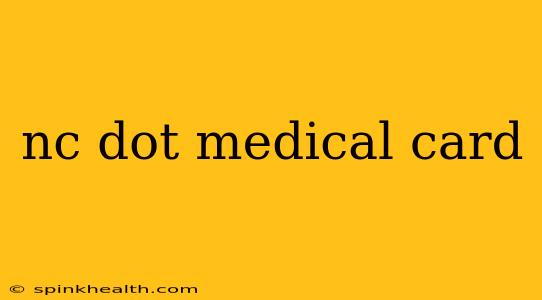Navigating the NC DOT Medical Card: A Driver's Guide
The North Carolina Department of Transportation (NCDOT) medical card isn't just a piece of paper; it's a crucial document for many drivers, particularly those operating commercial vehicles. This seemingly simple card signifies a driver's fitness to operate a vehicle, a certification obtained after a thorough medical examination. But the process, the requirements, and even the implications of holding (or not holding) this card can be confusing. Let's unravel the mystery surrounding the NC DOT medical card, addressing some common questions along the way.
Imagine this: John, a long-haul trucker, relies on his NCDOT medical card to earn a living. His livelihood depends on his ability to pass the required medical examination and maintain the necessary certifications. This journey isn't always smooth sailing, however. Understanding the intricacies of this process is vital for drivers like John, ensuring they remain compliant and on the road.
What is an NC DOT Medical Card?
The NC DOT medical card certifies that a driver meets the Federal Motor Carrier Safety Administration's (FMCSA) physical qualification standards for operating commercial motor vehicles (CMVs). It's not just a North Carolina-specific requirement; it's a federal mandate. The card confirms a driver is medically fit to handle the physical and mental demands of driving a CMV, ensuring both the driver's safety and the safety of others on the road.
What are the requirements for obtaining an NC DOT Medical Card?
Obtaining an NC DOT medical card involves a medical examination performed by a medical examiner registered with the FMCSA. This examiner assesses various aspects of the driver's health, including:
- Vision: Visual acuity, field of vision, and color vision are all assessed.
- Hearing: The ability to hear crucial sounds is tested.
- Cardiovascular health: Blood pressure, heart rate, and any existing heart conditions are evaluated.
- Nervous system: Neurological function is examined.
- Musculoskeletal system: The examiner checks for any conditions that might affect the driver's ability to control the vehicle.
- Mental health: This assessment is crucial, looking for conditions that might compromise safe driving.
The specific requirements are detailed in the FMCSA's regulations, so it's crucial for drivers to review these thoroughly before their examination.
How long is an NC DOT Medical Card valid?
The validity period of an NC DOT medical card depends on the driver's health and the medical examiner's assessment. It can range from one year to two years. This isn't a one-size-fits-all situation; the medical examiner determines the appropriate duration based on individual health conditions and risk factors. Regular follow-up examinations are often required to maintain the card's validity.
What happens if I don't have an NC DOT Medical Card?
Driving a CMV without a valid NC DOT medical card is a serious offense. It can lead to hefty fines, suspension of driving privileges, and even potential criminal charges. This isn't just a minor infraction; it carries significant legal and financial consequences. Compliance is paramount for any driver operating a commercial motor vehicle.
Where can I find a list of FMCSA-registered medical examiners in NC?
The FMCSA provides a searchable database of registered medical examiners nationwide. You can easily locate medical examiners in North Carolina through their online resources. This database ensures you're choosing a qualified professional to conduct your examination. Choosing a physician not registered with the FMCSA could invalidate your medical card.
What are the common reasons for denial of an NC DOT Medical Card?
Several health conditions can lead to the denial of an NC DOT medical card. These conditions often relate to the driver's ability to safely operate a commercial vehicle. Conditions such as uncontrolled hypertension, serious heart disease, or certain neurological disorders could lead to a denial. It is crucial to be completely upfront and honest during the medical examination to ensure accuracy.
The NC DOT medical card is more than just a permit; it’s a testament to a driver's commitment to safety and compliance. It's a critical component in ensuring the safe and efficient movement of goods across the state and beyond. Understanding the process, requirements, and potential consequences is crucial for all drivers of commercial motor vehicles in North Carolina.

